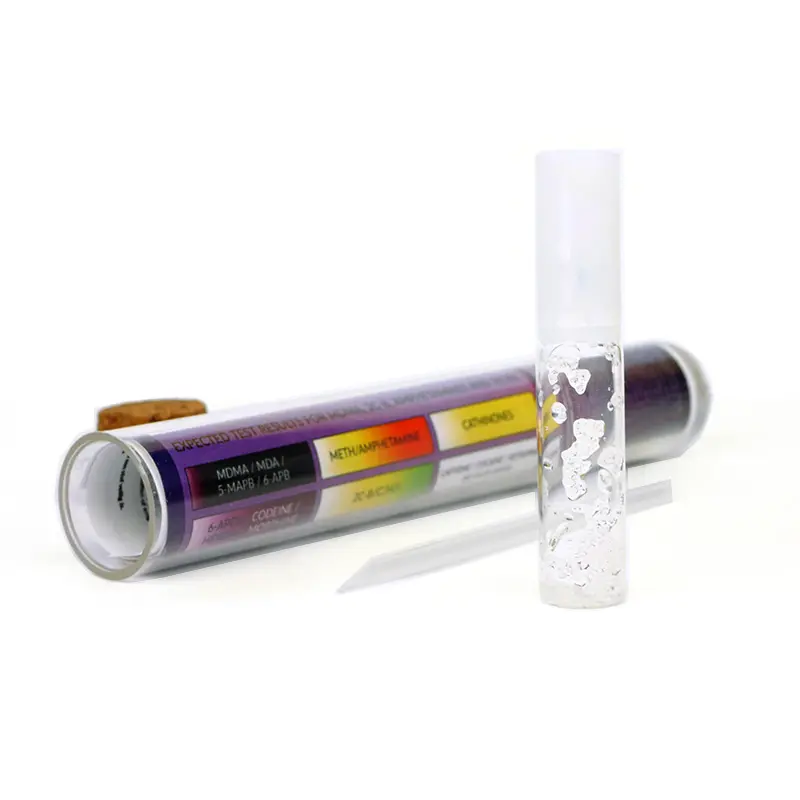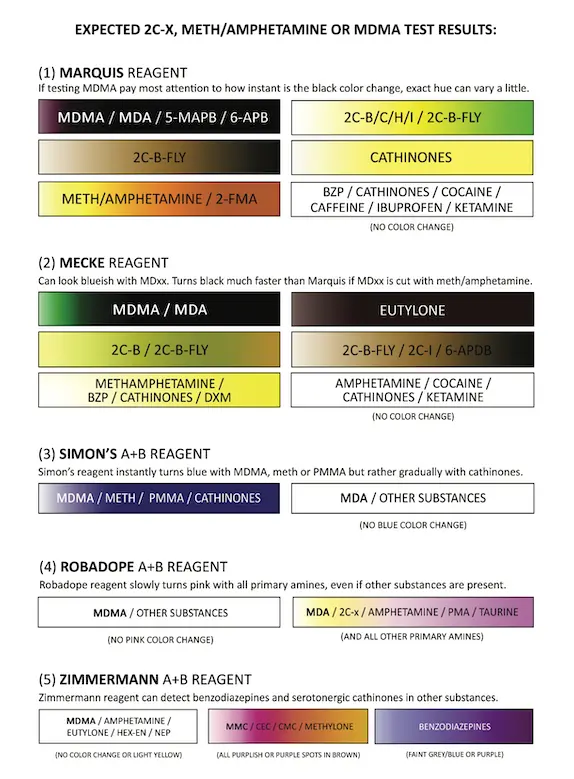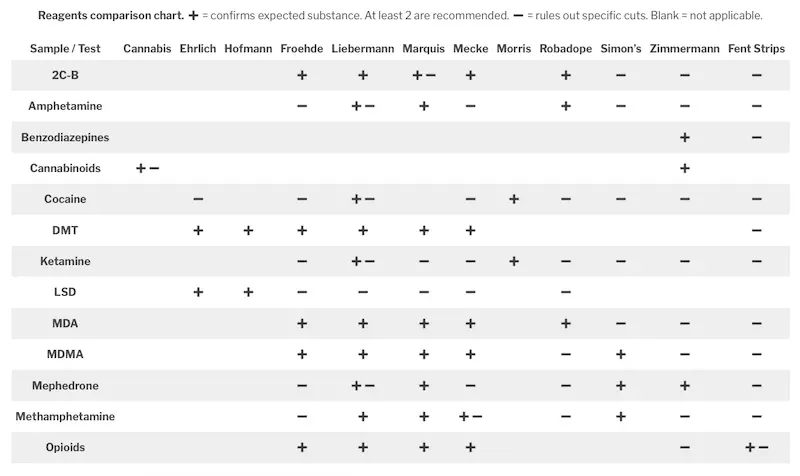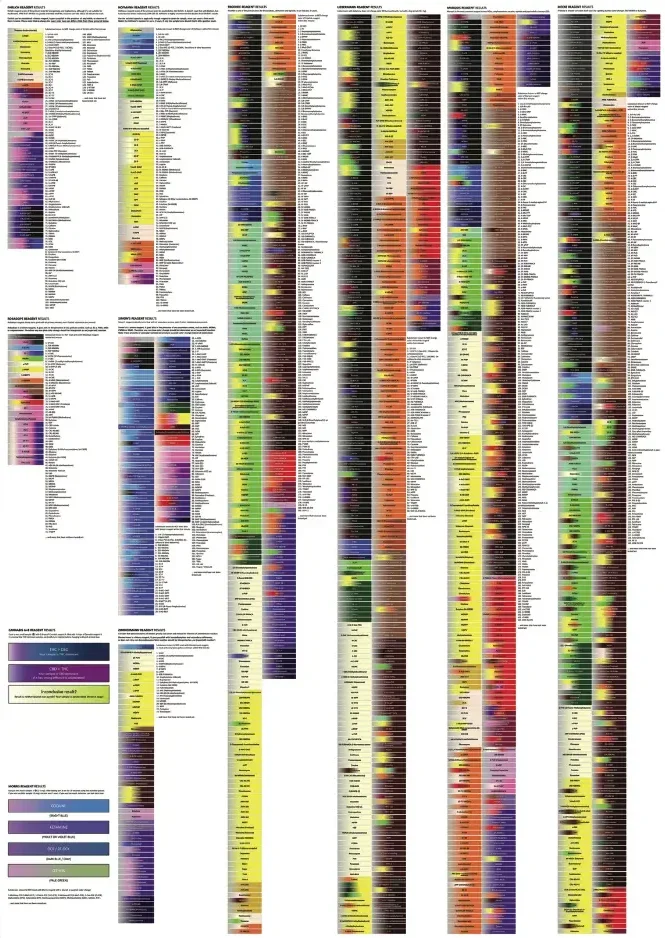GUIDE How to test MDMA?
How to test MDMA (Ecstasy / XTC / Molly): if you intend to use a psychoactive substance first you need a test kit to check purity. Pure MDMA can look white, brown or tan and can’t be identified by appearence. Check your sample with a single or multi-use MDMA test kit.
MDMA tester
Recommended MDMA testing kits
Recommended multi-use MDA/MDMA reagent test kit includes reagents Marquis, Mecke, Simon’s, Robadope and Zimmermann. Reagents Marquis, Mecke, Simon’s are required to identify MDMA. Robadope reagent helps detect 2C-B, amphetamine, MDA, PMA or taurine. Zimmermann reagent helps detect benzodiazepines and cathinones. To discover full ingredients and estimate MDMA % pair reagents with TLC MDMA Purity Test Kit. To detect fentanyl use the fentanyl test strips.
STEP ONE How to identify MDMA?
How to use reagent tests?
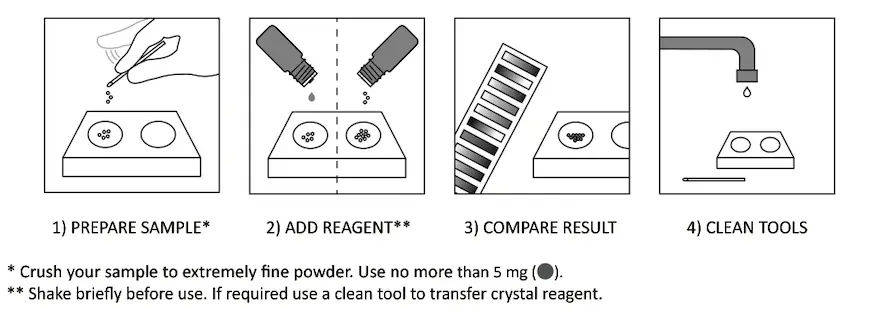
TL;DR: Below is an image with a quick cheat sheet how to use the MDMA Test Kit and further down you can check out more detailed guide how to test MDMA. Use the MDMA reagent test chart to see how to use Marquis reagent, Mecke, Robadope, Simon’s and Zimmermann, check the expected results.
MDMA test results chart:
| TEST | MDMA |
| MARQUIS | Instant purple / brown > black |
| MECKE | Instant green > black |
| MANDELIN | Instant black |
| LIEBERMANN | Instant black |
| FROEHDE | Instant black |
| EHRLICH | No color change |
| HOFMANN | No color change |
| SIMON’S | Instant blue |
| ROBADOPE | No pink color change |
| MORRIS | Green |
| ZIMMERMANN | No color change / faint yellow |
| CANNABIS (4-AP) | No color change |
MDMA reagent test chart
What are MDMA test kit reagents used for?
| SAMPLE | RECOMMENDED MDMA REAGENT TESTS |
| MDMA / MDA / METH/AMPHETAMINE / 2C-B |
Reagent tests indicate presence of a substance, therefore can either help confirm presence of the expected compound or help rule out certain cuts.
- Marquis – main test for most powders, secondary test for ketamine, mephedrone and psychedelics
- Mecke – main test for most powders, secondary test for cocaine, ketamine and mephedrone
- Simon – main test for secondary amines, e.g. MDMA, meth, mephedrone, methylone or PMMA
- Robadope – main test for primary amines, e.g. MDA, amphetamine or PMA
- Zimmermann / Beam – main test for cathinones and benzodiazepines in geneal, detects also CBD
- Single use MDMA test kit includes Marquis reagent
- Multi use MDMA reagent test kit includes reagents Marquis, Mecke, Simon’s, Robadope and Zimmermann
Marquis reagent is the main test for MDMA and produces an instant black color change with MDMA, MDA, but also MDEA and a few other compounds. Mecke reagent is the recommended follow up test.
Simon’s and Robadope are useful both to confirm MDMA or MDA as well as detect primary amines (2C-x, amphetamine, MDA, PMA) in MDMA, or secondary amines (meth, MDMA, PMMA, mephedrone derrivatives) in MDA. Zimmermann reagent helps rule out secondary and tertiary cathinones, mostly MMC and PVP analogs.
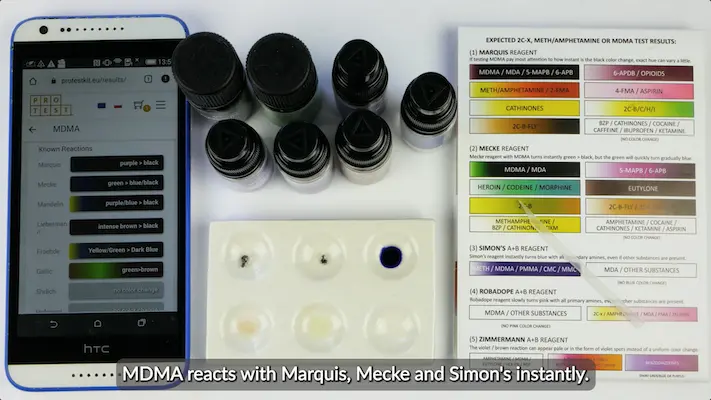
MDMA test kit results
MDMA vs MDA (or MDA vs MDMA)
STEP TWO How to test MDMA purity %?
To discover all adulterants and estimate quantity pair reagent tests with a TLC (Thin Layer Chromatography) Purity Test Kit. TLC purity tests alone don’t identify substances and are best paired with at least 1-2 reagent tests. Thin Layer Chromatography is one of classic substance analysis methods. It works by separating different compounds depending on their solubility in chosen TLC testing liquid (eluent). To precisly estimate MDMA purity pair a reagent test kit with the MDMA Purity Test Kit.
How to test quality of MDMA?
Qualitative TLC:
TLC test works by separating substances present in a sample, each detected spot indicates a different substance.
- You can use an already confirmed sample for reference – if both compounds show up at the same height on the TLC “card” that indicates they can be the same substance.
- You can use any substance for reference after establishing their relation – if substance X shows up twice as high on the same testing “card” as substance Y, you can expect them to keep that ratio.
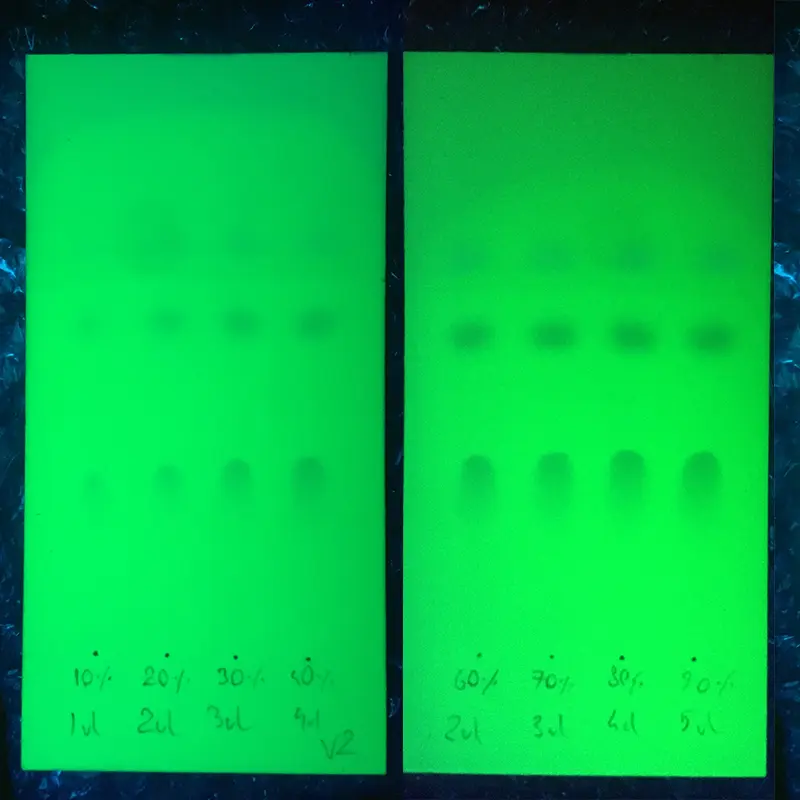
TLC Cocaine Purity Test potency scale

TLC MDMA Purity Test potency scale
How to test quality of MDMA?
Semi-quantitative TLC:
TLC helps estimate quantity (potency). The bigger the size of the detected spot, the bigger the amount of measured substance. Note that different substances need different calibrated rulers and often different testing liquids (eluents).
- Use a calibrated potency % ruler to estimate result with +-10% accuracy
- One spot indicates a pure substance. If your sample fully dissolved in testing liquid and only one spot was detected on TLC then your substance is pure. Trace amounts of impurities might not be detected, do not rely on TLC for fentanyl testing – get also fentanyl test strips.
How to use TLC purity tests?
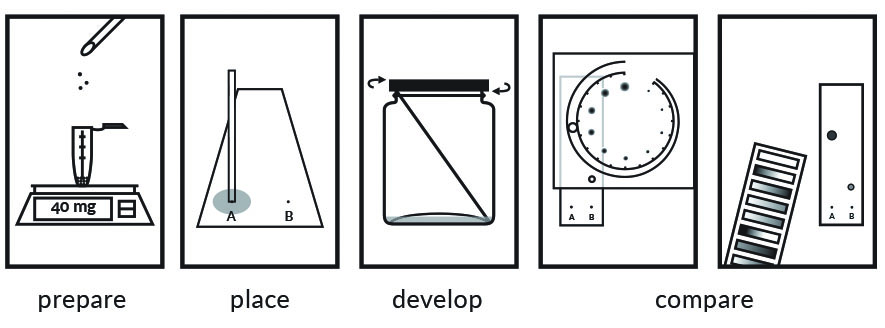
How to test MDMA for fentanyl?
Use fentanyl test strips (a fentanyl test kit)
METHOD 1
If testing a benzo/opioid pill, crush one in a plastic baggie and dump out the powder. Then add 10 drops of water into the baggie and mix well. Dip the test strip no higher than the thick line. Wait 15 seconds. Put the strip away and check in 5 minutes.
METHOD 2
Mix 100 mg of sample in 200 ml of water. Dip the test strip no higher than the thick line. Wait 15 seconds. Put the strip away and check in 5 minutes.
COMPARE RESULTS
1 line = fentanyl, 2 lines = no fentanyl. Faint lines also count. Ignore fentanyl tester results after 5 minutes.
To detect all ingredients and estimate their amount pair reagents with a TLC purity test kit.
A positive or negative test result does not indicate if a substance is safe. No substance is 100% safe.
